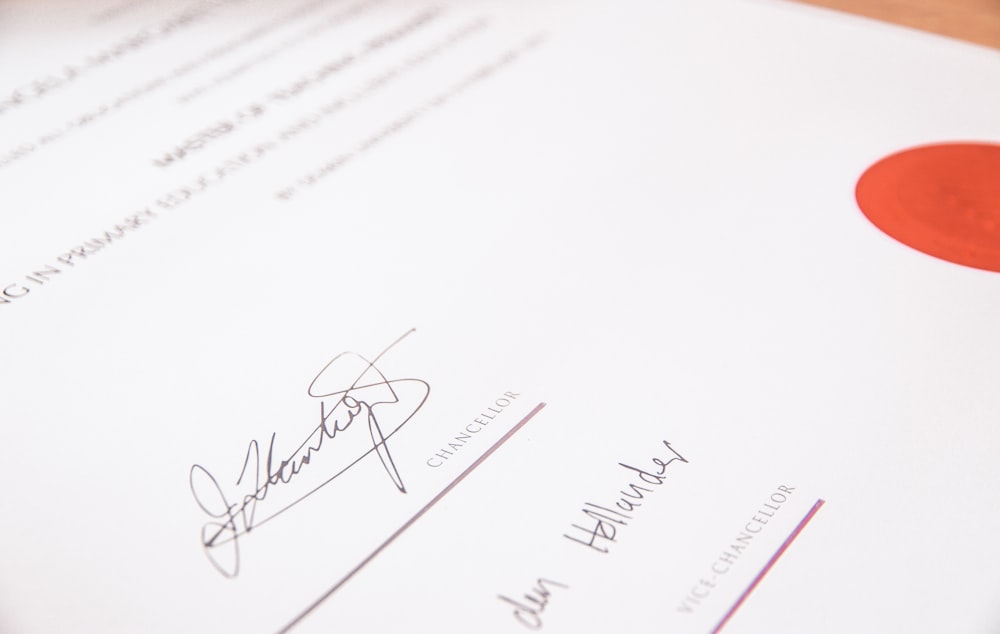Required Documents To Obtain When Starting A Business

Photo by Scott Graham @ unsplash
Disclaimer: The views expressed in this article belong to an independent guest author and not Leaderonomics, its directors, affiliates, or employees.
You're excited to start your business, but where do you begin? Before your business idea turns into an actual reality, there are some required essential documents you should have in place. These will help establish the groundwork for a successful business.
You must get the required documents before starting your business. A document filing service provider like Swyft Filings can also be an excellent option to help you out. However, this article discusses the required documents to obtain when starting a business.
1. Business Registration Certificate
A Business Registration Certificate (BR) is a document issued by the Registrar of Companies to a business entity that shows its existence. The certificate confirms that the company is registered and active and can be used as proof of its existence as a company.
The BR must be submitted to the Registrar when you register your business name for the first time; it's issued after the business has been incorporated and accredited by ROC. Most countries require businesses to obtain this certificate to continue operating legally or conducting business transactions overseas.
2. Tax Identification Number Certificate
A Tax Identification Number (TIN) is an identification number assigned to your business by the Internal Revenue Service. It can be used to file taxes, pay for services and collect sales tax in certain areas.
The primary purpose of a TIN is to identify businesses filing income tax returns. Most businesses need one, but some specific industries require them more than others: companies selling products or services online and businesses that receive payments from customers through PayPal. Also, those offering services such as accounting or legal advice and consultants who earn commissions on the sale of goods and services need a Tax Identification Number.
You'll find that your TIN will follow you throughout the life cycle of your business. This includes when you start as an LLC (Limited Liability Company). This is a necessary certificate to get before starting a business.
3. Business License
A business license is a document issued by the government to authorise the operation of a business. To operate your own company, you must obtain an operating permit or license from your local municipal corporation office. The license is valid for a year and needs to be renewed annually. Banks need a valid business license to open an account for your business. A bank account is essential for your business, as it helps with financial transactions, payroll, and cash flow in and out of the company.
4. Sole Proprietorship Or Partnership Deed
A partnership deed is a legal document that states the relationship between partners in a business. In other words, it explains who owns what and how profits are distributed. It's required for partnerships but not for sole proprietorships or corporations. You should get one from your lawyer if you're starting a partnership. If you don't have one, your business will not be recognised as a legitimate entity by the government's registrar of companies or any other government agency that may require it (such as banks).
You can also register your business as an LLC. To obtain clear insights on how much does an LLC cost per year, we recommend you consult a registered agent in your state, as the cost of filing an LLC differs from state to state. You can read this SmallBusinessHQ review post on registered agents Inc Authority and ZenBusiness for more information.
5. Professional Or Shop And Establishment License
Before starting your business, you'll need to obtain a professional or shop & establishment license from the local municipal office. These licenses are necessary for any business operating in a specific area, depending on the type of business. For example, if you're opening up a restaurant, bar, or nightclub, then you need to obtain a food and beverage license from the same municipal office. There are different licenses for each type of establishment, so you must identify which type applies to your particular situation before applying for one.
The process is pretty straightforward:
- Contact your local municipal office and request an application form.
- Fill out the application form with all relevant information (name of owner/s).
- Attach relevant documents such as proof of residence and land titles and pay applicable fees at any bank branch near where the proposed business will be located for example, with open banking in Australia.
Alternatively, some municipalities may allow applicants who aren't physically present in their jurisdiction access to online tools that can help guide them through pre-application steps and assist them with every step towards securing their professional or shop and establishment license.
6. Business Name Certificate
A Business Name Certificate is a vital document to start a business. It is issued by the state government and certifies that you are allowed to use the name of your company or organisation as your trade name. The certificate also states whether or not there are any restrictions placed on the use of the business name. The certificate can be used as a form of identification for your company and is required by law when starting a business.
7. Confidentiality Agreement
A confidentiality agreement is a document that helps protect your business's confidential information. It's an essential document to have when starting a new business because you'll likely be sharing some of your ideas and processes with others as you build up your product or service. Nowadays, it can be all done digitally or businesses can use tools to convert to PDFs to make face-to-face document sharing and editing much easier and more efficient.
By signing this document, your employees agree that they will not share any information they know about your company with anyone outside of it. If they do share confidential information, there may be legal repercussions for them.
A confidentiality agreement is significant if you plan to patent parts of your business or product. This agreement can also be used during the hiring process for employees who may have access to sensitive information about the company's finances or business plans.
8. Bank Account Details And Loan Documents
A bank account is a must-have for your business. You'll need to open an overdraft facility, current account, savings account, and fixed deposit accounts. You can also open recurring deposit accounts for different purposes, such as funds for operations or capital expenditure.
Optional documents include business structure certificates, trademark registration, and copyright certification. These are not necessary for starting a business but will help protect your company's assets in the long run.
Conclusion
Starting your business can be an exciting experience. However, you must consider the documents you'll need to kick-start your business. If you're still unclear about these documents, contact your local government office and ask for guidance. They can answer any questions you may have and provide additional guidance.
About Author: Walter Crawford is a former business coordinator who is now an entrepreneur. He shares his experience and knowledge on business matters for start-ups and small businesses through guest posts and seminars. In his free time, he enjoys taking his family on trips.
Leaderonomics.com is an advertisement free website. Your continuous support and trust in us allow us to curate, deliver and upkeep the maintenance of our website. When you support us, you allow millions to continue reading for free on our website. Will you give it today? Click here to support us.
Business
Tags: Hard Talk, Consultant Corner
This article is published by the editors of Leaderonomics.com with the consent of the guest author.









